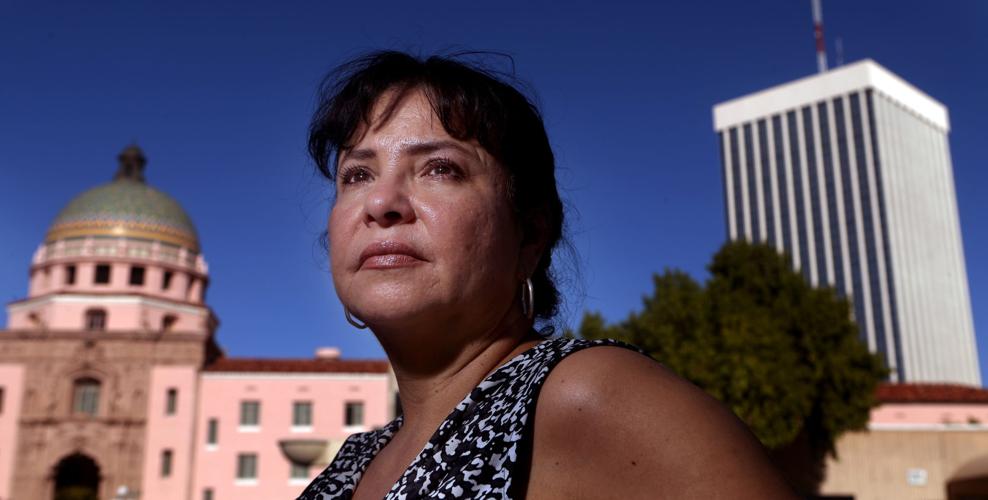Liz Martinez couldn’t contain her frustration during a public forum hosted by behavioral health insurer Cenpatico Integrated Care last week.
As CEO Terry Stevens described, to a crowd of about 40 people, Cenpatico’s success in stabilizing members who are in crisis, Martinez raised her hand.
“I don’t believe that to be true,” she said. The victims advocate described months of struggling to get help for her then-fiancé as he descended into a full-blown manic crisis this spring.
The man, who has bipolar disorder, began saying in March that his medications weren’t working anymore. He went days without sleeping and couldn’t sit still. He once tried to open the car door as she was driving 55 mph. But the agency treating him said he had to wait for his May appointment to get a medication review, Martinez said.
In the meantime, he deteriorated mentally and physically. He lost 30 pounds. At one point he approached police officers on the street and asked to be arrested. Yet Martinez couldn’t convince crisis responders or behavioral health providers that he was a danger to himself and needed to be hospitalized.
He was eventually hospitalized and put on new medications, but he’s not the same, Martinez said in an interview. He lost his full-time job as a cook during the breakdown and is still trying to get back to a place of stability. After nearly having a breakdown herself, Martinez ended their engagement; she said she didn’t feel she could marry him, knowing he was completely at the mercy of a broken system.
“I still feel like he’s my best friend. I just can’t trust what would happen if he had another episode,” she said.
Mental health advocates say vulnerable patients are bearing the brunt of upheaval in the public behavioral health system since Cenpatico, the for-profit subsidiary of publicly traded insurance giant Centene Corp., became Southern Arizona’s regional behavioral health authority last October.
In Arizona, RBHAs contract with the state Medicaid agency, AHCCCS, and administer Medicaid dollars to contracted behavioral health providers who treat low-income patients. This is Cenpatico’s first foray into Pima County after 10 years in rural parts of the state.
Some patients are in turmoil after the closure of Pasadera Behavioral Health Network, a provider that shut down this month in the face of mounting financial strain. The pressures included Cenpatico’s recruitment of other providers whose services would replace Pasadera’s, along with reduced reimbursements.
For Johnny Hostetler’s 27-year-old daughter — a Pasadera patient who didn’t want her name used — the agency’s closure meant a transition to CODAC Behavioral Health Services and another round of intake interviews and psychiatric evaluations.
But Hostetler said her daughter’s transition was beset by confusion and delays. That was likely worsened by an increase in volume at CODAC, as it received patients moving from the shuttered Pasadera, a CODAC spokeswoman said.
It took weeks for Pasadera to transfer medical records to CODAC and more time to get an appointment with CODAC. In the meantime, Hostetler said her daughter ran out of the medication that keeps her stable. Her former Pasadera psychiatrist couldn’t write her another prescription because she was no longer his patient, but she wasn’t yet a CODAC patient, Hostetler said. Her daughter has bipolar disorder and severe anxiety.
“She was holding on without the Zoloft, but I could see her spiraling,” Hostetler said. She resorted to buying Zoloft for $9 a pill on the black market after her daughter had a breakdown. They cut the pills in half to make them last longer.
“I’ve never done anything like that in my life, but you get desperate,” she said.
Once the Pasadera records were transferred, CODAC told Hostletler’s daughter to show up in the early morning for the chance to get a same-day appointment — if there was an opening and she is at the front of the line. She showed up between 5 a.m. and 6 a.m. for three days in a row before she was seen by an intake specialist.
Hostetler said her daughter still hasn’t had an appointment with a psychiatrist, which was scheduled for 90 days after her initial visit last month.
Early-morning waits for patients desperate for treatment aren’t unusual these days, providers say. Overburdened intake agencies commonly tell patients to show up early for a chance at getting seen that day — for some, that’s the only way to initiate treatment for specialty services that require a referral, said Deb Seng of Our Family Services. The agency’s therapists often end up providing their services unbilled, because it can take six to 10 weeks to get the referral that allows them to bill Cenpatico, she said.
Seng said caseworkers are spending hours, day after day, waiting alongside their clients, hoping for an appointment with an intake specialist. In the meantime, patients are nearing the point of crisis, she said.
“Not only are they breaking into psychosis, they’re devolving into suicidal and homicidal thoughts,” she said at the public forum. “Our therapists are sitting in the homes of members who are saying, ‘I am going to kill someone if I don’t get help today.’”
CENPATICO OUTREACH
After Martinez spoke up at the forum last week, Cenpatico’s CEO listened and said the insurer would investigate her then-fiancé’s treatment, reviewing records and conducting interviews with the providers involved.
CEO Stevens acknowledged that Cenpatico hasn’t managed a smooth changeover from Pima County’s last RBHA, the nonprofit Community Partnership for Southern Arizona. She said she takes to heart the criticisms aired last week during the forum.
“I’m not unfamiliar or unwilling to look at the challenges,” she told the crowd. The transition “wasn’t as smooth as I would have anticipated or I wanted, but it’s not for lack of trying and we continue to do that.”
Martinez’ concerns were among many raised at the event, the first of three public forums to be hosted by Cenpatico this month. Attendees painted a picture of an underfunded and chaotic public mental health care system, with deep-seated problems exacerbated by a tumultuous transition to Cenpatico.
One mental health provider described case managers’ impossibly high caseloads of more than 200 patients. Constant turnover due to burn-out means patients rarely have the same case manager for long, contributing to fractured care, patient stress and delays. Behavioral health agencies are facing high demand for services, while dealing with new stringent reporting requirements and contract cuts from Cenpatico.
Another provider spoke up in support of Cenpatico’s ambitious goals and efforts to reform the public mental health system.
“I think you’ve bitten off a lot, but it needed to be tackled and attempted,” said Margaret Higgins, executive director of The Haven, a residential treatment facility. “We’ll come out at the other end stronger and better.”
One woman questioned when the public could see the mortality and morbidity patient data that RBHAs collect, which could illuminate how patients are faring under Cenpatico. Cenpatico’s Stevens said that data would be posted on Cenpatico’s website after it’s calculated, following the end of the first contract year.
This is the second year Cenpatico has hosted community forums in Pima County. Those sessions are a crucial way for the insurer to engage with the community and provide updates on services, Stevens said in a emailed statement.
PATIENTS IN CHAOS
To serve their patients in a reasonable time frame, local behavioral health agencies need more funding and more staffing, said Stephania O’Neill, the former CEO of behavioral health agency Compass, which merged with another agency in 2013 to become Pasadera.
“It’s not like the provider doesn’t want to do the job,” she said at the forum. “It’s a workforce issue. It’s a resource issue. … I’m tired of people telling me, ‘It’s just the way it is, there’s nothing you can do.’ I won’t accept it.”
In an interview, Seng said Our Family’s clients are some of the community’s most vulnerable, and barriers to getting them treatment must be torn down for everyone’s sake.
“If we don’t find solutions to get timely services for these folks, they will disengage completely and are likely to live out their lives on the streets,” she said.
After the forum, Stevens said she’d heard about patients having to wait in the morning for appointments even before Cenpatico entered Pima County. But she acknowledged that access issues for patients may have been compounded by the transition.
O’Neill suggested establishing an independent community task force comprised of experts without a financial stake in the system to help address fundamental problems. Stevens said that was a good idea.
“I truly can’t express how thankful I am that you’re being honest,” she told the crowd. “The only way we can fix things is if we know that they’re happening.”
INTEGRATED CARE
Other Pima County patients are frustrated with the limitations of Cenpatico’s network for medical providers.
Cenpatico’s medical coverage is part of AHCCCS’s broader plan to integrate behavioral and medical coverage for people on Medicaid with serious mental illness. The goal is to better coordinate care for people in that group whose life expectancy is, on average, nearly three decades shorter than that of the general public.
But that means patients in the behavioral health care system no longer have a choice about which AHCCCS plan they enroll in for their medical care — they are automatically enrolled in Cenpatico’s plan, which might not contract with their long-time doctors.
Megan Gregory, 25, has bipolar disorder, OCD and anxiety, as well as a rare heart condition that causes an abnormally high resting heart rate. Her cardiologist of seven years isn’t in Cenpatico’s network.
Gregory said she wanted to opt out of Cenpatico’s medical plan to stay with her doctor, but Cenpatico told her since other cardiologists were in their network, she couldn’t opt out.
“Opting out is reserved for occasions where there may only be one specialist that provides the service that the member needs and that provider has elected not to contract with the RBHA,” AHCCCS spokeswoman Monica Coury said in an email.
Gregory is now planning to disenroll from Cenpatico behavioral health care coverage and pay for her mental health needs out of pocket so she can stay with the doctor who knows her heartbeat so well that he can hear the slightest anomaly, she said.
“She’s having to choose between her medical and behavioral health care,” said her mother, Angela Lane, a social worker.
Coury said patients in active treatment with an out-of-network doctor — such as for cancer treatments or pregnancy — can stay with the doctor for the duration of their treatment. For patients who aren’t in active treatment but have an established relationship with the doctor, AHCCCS requires the RBHA to reach out to the doctor and offer a contract. If the doctor declines, that’s his or her choice, she said.
“This is common in any type of insurance,” Coury said in an email. “Your commercial carrier will not pay out of network for care you can receive from one of their contracted providers.”
Cenpatico has more than 6,500 specialty and behavioral health providers in its Southern Arizona network, and plans to continue adding doctors, Stevens said.
“Our provider network is robust and continues to expand as our membership grows,” she said.
There’s only so much Cenpatico can do in the face of a chronically underfunded public mental health system, Clarke Romans, executive director of the National Alliance on Mental Illness of Southern Arizona, said at the forum.
Real change will require the political will to devote more resources to mental health, he said. More than 650,000 people in Arizona have serious mental illness, he said. That’s a large constituency and they — and their loved ones — must exercise their right to vote, he said.
“This is a political problem,” he said. When it comes to mental health in the U.S., he said, “We’re big, we’re rich, and we’re doing a terrible job.”





